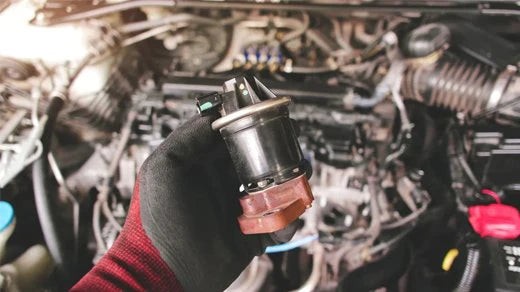Exhaust Gas Recirculation (EGR) delete kits are a popular modification for diesel and gasoline engines, promising performance enhancements and fuel economy gains. However, the legality of these kits is a complex issue that varies significantly depending on location and application. This article delves into the legality of EGR deletes, the potential benefits and drawbacks, and the implications for vehicle owners.
What is an EGR Delete and How Does it Work?
An EGR system reroutes a portion of exhaust gases back into the engine’s intake manifold. This process reduces combustion temperatures, which in turn lowers the production of harmful nitrogen oxides (NOx). An EGR delete kit removes or disables this system, allowing for potentially increased power and fuel efficiency. The kit typically includes components like an EGR cooler delete, block-off plates, and sometimes a tuner to adjust the engine’s computer.
The Legality of EGR Deletes: A Gray Area
The legality of EGR deletes hinges on whether the vehicle is used on public roads or exclusively for off-road purposes. In the United States, it is illegal to tamper with or remove emissions control systems on vehicles driven on public roads. This includes EGR systems, as they are crucial for meeting federal emissions standards. The Clean Air Act prohibits modifications that negatively impact a vehicle’s emissions control systems. Penalties for violating these regulations can be substantial, including hefty fines.
Some jurisdictions may make exceptions for vehicles used solely for off-road racing or agricultural purposes. However, it is crucial to consult local and state regulations to confirm the specific requirements in your area. Always err on the side of caution and assume that EGR deletes are illegal for on-road vehicles unless explicitly stated otherwise.
Potential Benefits and Drawbacks of EGR Deletes
While EGR deletes might offer certain advantages, they come with significant risks:
Potential Benefits:
- Increased Power and Torque: Bypassing the EGR system can lead to slightly increased power output and improved engine responsiveness, particularly in diesel engines.
- Improved Fuel Economy: Some argue that EGR deletes can improve fuel efficiency by allowing for a more complete burn of fuel. However, this is often debated and may not be significant.
- Reduced Carbon Buildup: EGR systems can contribute to carbon buildup in the intake manifold over time. Deleting the system can prevent this issue.
Drawbacks:
- Illegality for On-Road Use: As mentioned earlier, using an EGR delete kit on public roads is illegal in most jurisdictions and can result in significant fines.
- Voided Warranty: Modifying the emissions system can void the manufacturer’s warranty, leaving you responsible for costly repairs.
- Increased Emissions: EGR systems are designed to reduce harmful NOx emissions. Deleting the system can significantly increase these emissions, contributing to air pollution.
- Potential Engine Damage: In some cases, removing the EGR system can lead to increased engine temperatures and potential damage to components like the engine block or cylinder head.
EGR Deletes for Specific Engines: 6.7 Cummins and 6.7 Powerstroke
EGR delete kits are often marketed for specific diesel engines like the 6.7 Cummins and 6.7 Powerstroke. While the kits themselves might differ slightly in design, the legality and associated risks remain the same. Modifying these engines with EGR delete kits for on-road use is still illegal and can void warranties.
Conclusion: Weighing the Risks and Rewards
While EGR delete kits might seem appealing for performance enthusiasts, the legal ramifications and potential negative impacts on the environment and vehicle health should be carefully considered. The substantial fines and potential engine damage associated with illegal EGR delete far outweigh any perceived benefits. For on-road use, adhering to emissions regulations and maintaining the integrity of your vehicle’s emissions control system is paramount. If you are considering modifications to enhance performance or fuel economy, explore legal and environmentally responsible alternatives that comply with all applicable regulations.

